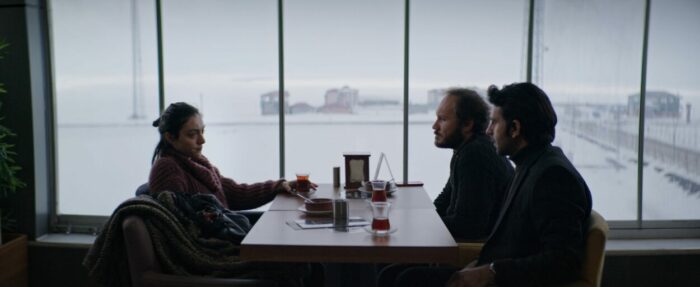Arguably the most celebrated Turkish filmmakers of the modern era, husband and wife duo Nuri Bilge and Ebru Ceylan have won acclaim for decades through their somber intellectual meditations on the disappointments and compromises of life in rural Anatolia. As that will suggest, their work does require some patience on the viewer’s part and different audience members will respond with varying levels of indulgence. For myself, Winter Sleep is a bona fide modern masterpiece, but their other works rarely reach the same tortured dramatic heights. There’s a lot of consistency in style and theme across their works and like Ingmar Bergman, Wes Anderson or Yasujiro Ozu, if you don’t absolutely love what they’re about then you’re probably just going to find watching more than one or two feels a bit intellectually redundant and although I’ll always love Winter Sleep, I think I’ve about reached my quota with About Dry Grasses.
The film follows Samet (Deniz Celiloglu) a cynical liberal schoolteacher who is, he hopes, coming to the end of a four year exile teaching drawing classes to the children of farmers, a task he hardly bothers hiding his contempt for. He’s single but rebuffs any attempts to be set up with anyone local, refusing to set down roots beyond his nightly drinks with disreputable locals and his chats up at the spring with his housemate Kenan (Musab Ekici). He’s a talented photographer and captures portraits of the locals, but his anthropological interest conceals an underlying resentment and contempt for people he regards as uncivilized and base. The one real exception to his blanket disinterest in his surroundings is Sevim (Ece Bagci) a girl in his class who he regards as something of a teacher’s pet. He brings her gifts and displays a disquieting fondness for her, generally behaving quite inappropriately and when she’s embarrassed by another teacher, she exposes him, setting the scene for what could be a dark inversion of Thomas Vinterberg’s The Hunt, where a wrongly accused teacher faces no repercussions, but begins a vicious vendetta against his accuser.
But the Ceylan’s like to keep multiple narrative plates spinning and Samet’s obsession with this young girl is paralleled with his only marginally less gross courtship of sensitive fellow teacher Nuray (Merve Dizdar). Despite her beauty, sensitivity and intelligence, he’s uninterested by her until he introduces her to Kenan and only when he witnesses the sparks between them does he show interest in seducing her. At this point you may be asking yourself, “so…is there anything redeeming about this guy and if not, why should I watch this 197 minute long movie about him?”

Yes, a great many excellent films have been made about deeply unlikable characters: Return to Seoul, Last Summer, Uncut Gems, Tar, Red Rocket, to name but a few recent examples. More relevantly, I’d cite Winter Sleep and The Wild Pear Tree as comparable Ceylans’ works about similarly vain, self-absorbed pseudo-intellectuals engaging in lengthy combative dialogues with those around them. Sadly though, those films were just more compelling, both in their conversations, their stories, and their characters. We do get a very good understanding of Samet, what’s going on in his head, and why he acts as despicably as he does, it’s just not very exciting to watch, emotionally or intellectually. I should also be clear: he’s not a monster or a predator, just slightly pervy and pathetic, a selfish insecure loser who thinks he’s better than everyone else.
The drama doesn’t really go anywhere, and the more revealing conversations are certainly well written and acted (it’s clear why Dizdar won the Best Actress prize at Cannes: she’s fantastic and just the kind of performance that this year’s supporting actress race is lacking) and do provide insightful commentary on the failings of the elitist liberal intellectual mindset, but they lack a certain combative electricity and fade soon after they’re over and aren’t sufficient to support such a meandering narrative that lacks a concise focus and narrative momentum. If we had a more sympathetic and relatable antihero to carry us through then there’d be more scope to get invested in the ideological dueling, but Samet’s behavior is just so consistently vindictive, hurtful, and petty that it’s hard to feel any kind of sympathy for his depression or existential torment, even if we can connect the dots to see how one potentially leads to the other.
Now, it’s clear that basic dramatic alignment isn’t what they’re going for here. There’s literally a fourth wall break. The film deliberately tries to prevent you getting too emotionally invested so you can properly appreciate the artistic statement at play. I can respect and understand that and have done many times before, however, in this case, I’m sorry to say that the artistic statement of this film just isn’t expressed with enough eloquence to get away with being so forceful and long-winded. Rather than captivate the senses, it frequently dulls them, and its disparate narrative threads work at cross purposes, all competing for the viewer’s patience. There are moments of clear brilliance in About Dry Grasses, but the complete picture they form is vague and ponderous, never going anywhere despite repeatedly threatening to. I really wanted to like this more than I did, I had high hopes for this, but the broad thematic base it spans just left me so much space to wander in and think about other films that explored this territory more effectively.
There’s no denying the sincerity and specificity of the Ceylans’ artistry, anyone who made Winter Sleep is undeniably touched by genius and that still comes through in the best moments here, but this still feels like a minor work in their catalog reserved only for their most passionate fans or the curious newcomers for whom it may steal some novelty from their earlier works.



